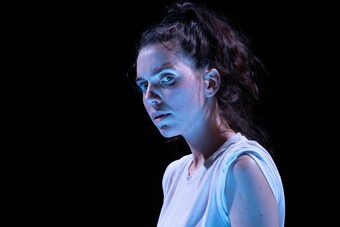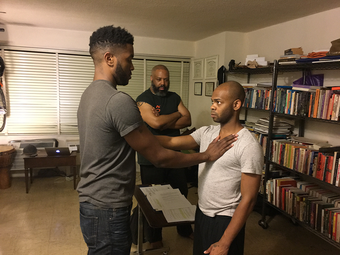Love, Sex, and Death in the Amazon at Paradise Factory
Can a dead man’s spirit be released? Can the bereaved lover reconcile differences with his abrasive mother-in-law? Who suffers more: the married, bisexual jungle guide, or the gay male widow whose mother-in-law threatens to unhinge him? Is love the fracturing or glue of reality?
As the inaugural production of Collider Theater Company at Paradise Factory—64 East 4th Street, which played through October 31—Robert Murphy’s eclectic, deeply affecting new play Love, Sex, and Death in the Amazon, directed by Jean Randich, exposes more questions than it resolves, so that when the play does reach its resolution, the audience is left startlingly raw.
The play opens as Walter (played by Max Wolkowitz), whose Brazilian partner Marcos (Zachary Infante) recently died of leukemia, arrives with his mother-in-law Dona Ines (Carmen Roman) in the Amazon rainforest, where the bereft duo plan to perform a traditional Umbanda ritual to free Marcos’s spirit from the limbo between life ending and death beginning. As Ines, Roman is volatile yet fragile, convincing in her role as bereaved mother. Walter’s escalating resentment of Ines will ring true for anyone who has suffered the interferences of difficult in-laws. And yet, Ines is ultimately a sympathetic character.
The scenes in which things go horribly wrong illuminate the human bond these characters increasingly realize they share… Those who have lost a partner or loved one will find common ground in this emotional firework of a play.
A pair of fanatic birdwatchers (Chance Mullen and Ron Moreno) arrives on the scene, along with a bisexual rainforest tour guide, who tempts Walter away from his monastic grief. The birdwatching dialogue is impeccably researched, and delivered with sharp wit, as is tour guide Fabio’s (Debargo Sanyal) dry commentary on Amazonian flora and fauna. Walter’s romance with Fabio unfolds in poignant, economical scenes. In fact, Murphy’s script—under Randich’s meticulous direction—splices together dramatic scenes and comedic interludes with delightful alacrity and astonishing force.
Scenic and Lighting Designer Jiyoun Chang has created a minimalist set of vivid blue-green platforms, the dark space is draped with the red woven venomous spider webs that convey all the rainforest’s lush, humid unpredictability. Costumes by Charles Schoonmaker combine neutral garments, bright whites, and vivid tropical hues to set an almost psychedelic scene. Video projections by Sue Rees offer beautiful close up shots of Marcos, and tropical birds, which appear upstage when the indomitable birdwatchers sight them, as during this exchange:
JACK: Head’s up, two o’clock behind the trees.
TOM: Not seeing it.
JACK: Big bushy trees to the left.
TOM: Holy crap, is that...
JACK: I think it is.
TOM: Ladies and gentlemen, the Amazonian Umbrella-bird! And he’s...he’s displaying! Oh my fucking god. Photos, Jack!... Gor. Geous. (Tom hands his binoculars to Walter) Here. Second set of trees...towards the top? Dead tree in the back? Very top branch.
WALTER: Oh yeah, weird looking bird.
Perhaps most gut wrenching are Walter’s scenes flashing back to the final, agonizing days of Marcos’ life, when the imperfect, abiding love they share is hardly a match for Marcos’ pain and terror. In one scene, Walter carefully changes Marcos’ diaper, an exchange so tender and excruciating the space fills with a stark intimacy, and vulnerability, rarely found in theatre. Marcos’ and Walter’s bond is beautifully evoked, and deeply felt. As Walter struggles to move away from Marcos’ grip on his heart, a kind of emotional release emerges, the necessary relief of the living letting their dead rest. Walter’s body remembers Marcos’ embrace, but knows it is time to let that bond fade.
As Ines—Marcos’ mother—Roman captures the façade of emotional denial perfectly. Her poise is touchingly regal, and her exchanges with Walter, who accuses her of abandoning her son on his deathbed, build in intensity through the play.
In the climactic rainforest scene, Ines and Walter (and a wily anteater) attempt the Umbanda ceremony, hoping to finally release Marcos’ spirit. The anteater’s untimely escape from Ines’ handbag, though initially humorous, sparks a pivotal scene between Ines and Walter. Her genuine frustration that he is not fully invested in the spiritual ceremony is a catalyst for their escalating confrontations, which resolve realistically—with a shaky peace as well as traces of familial rancor.
Despite what the audience might perceive as their unassailable bon vivant partnership, the two birdwatchers encounter peril when Tom (Mullen) has a potentially fatal encounter with rainforest wild life. Without giving too much away, I can say that the scenes in which things go horribly wrong illuminate the human bond these characters increasingly realize they share. There are tears, insults, endearments, trysts, drinking, memories brought to life, and, yes, dancing. Those who have lost a partner or loved one will find common ground in this emotional firework of a play.
Founded this year by director Jean Randich and playwright Robert Murphy, Collider Theater celebrates international cultural collision, and “aims to explore the bridges that connect us while also investigating our points of difference, disconnect, and incomprehension.” The company is inspired by the concept of a particle collider. “I see it as a theatrical accelerator,” Randich said, “In which one can smash together cultures to see how they collide, interact, and behave.” Randich has been directing new plays and reimagining the classics for almost thirty years. She teaches at Bennington College and NYU.
Founded this year by director Jean Randich and playwright Robert Murphy, Collider Theater celebrates international cultural collision, and ‘aims to explore the bridges that connect us while also investigating our points of difference, disconnect, and incomprehension.’
Robert Murphy has been writing for about eight years. Love, Sex, and Death in the Amazon is autobiographical—in 2009, Murphy’s Brazilian partner of eight years was diagnosed with aggressive leukemia, and died two years later. The epigraph in the production’s program—O amor só é bom se doer (Love’s only good if it hurts)—resonates as close to home. Murphy is interested in the tension between cultures, and, “people who find themselves stuck between two cultures, unable to feel at home in either world.” Love, Sex, and Death in the Amazon was a semi-finalist for the 2014 O’Neill Theater Center National Playwrights Conference. Of working with the cast on the play’s premiere, Murphy said, “It’s a joy to watch the actors constantly searching for new connections and ideas.” Also a sound designer and composer, Murphy has collaborated with Randich on numerous theater projects.
Recollecting a childhood memory of directing her brothers to enact scenes on a wooden bench built by her grandfather, Randich said, “A stage was a place from which to leap off into other worlds.”
Indeeed, this production of Love, Sex, and Death in the Amazon kicks off what promises to be a subversive, dynamic, and deeply humane new venture in theater.
***
All photos by T. Charles Erickson Photography.







Comments
The article is just the start of the conversation—we want to know what you think about this subject, too! HowlRound is a space for knowledge-sharing, and we welcome spirited, thoughtful, and on-topic dialogue. Find our full comments policy here